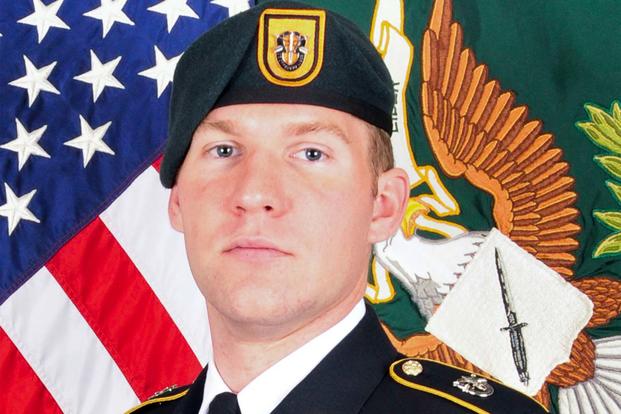A Green Beret killed by an improvised explosive device Tuesday was patrolling with an Afghan special forces team moving on foot against the Taliban, the chief U.S. military spokesman in Kabul said Thursday.
Army Staff Sgt. Matthew V. Thompson was on a NATO advisory mission on the outskirts of embattled Lashkar Gah.
Thompson, 28, of Irvine, California, was assigned to Company "A," 3rd Battalion, 1st Special Forces Group (Airborne), based at Joint Base Lewis-McChord, Washington. He was in an advisory role under NATO's Resolute Support mission, but his death came in what was described as combat.
In a video briefing from Kabul to the Pentagon, Army Brig. Gen. Charles Cleveland referred to statements in May by Defense Secretary Ashton Carter on how non-combat missions can quickly turn into combat in Afghanistan and elsewhere.
"These are non-combat missions," Cleveland said, but Afghanistan is inherently dangerous and troops assigned forward as advisers can often "find themselves in combat situations."
A second U.S. soldier was wounded by the IED blast that killed Thompson and six Afghans. "He's still here in Afghanistan, still receiving treatment. He is stable," Cleveland said of the wounded soldier, without describing his injuries further.
U.S. troops acting as advisers also moved forward with Afghan Ministry of Interior forces in response to the militant attack on the American University in Kabul on Wednesday that killed at least 16 and wounded dozens, Cleveland said.
However, the U.S. advisers were not believed to have entered the campus where two gunmen shot bystanders after a suicide car attack on the front gate, he said.
Cleveland disputed local and international media reports that the university attack and the threat to Lashkar Gah in southeastern Helmand province are only the latest incidents in a deteriorating security situation in Afghanistan.
Cleveland acknowledged that the Afghan National Defense Security Forces are taking casualties at a pace that exceeds that of 2015, when more than 20,000 were killed or wounded in what was the worst year for them since U.S. troops first entered Afghanistan in late 2001.
"For many militaries, that would break their backs," Cleveland said of the Afghan casualty rate, but the Afghan forces continue to make progress despite the attack on the university, Taliban advances in Helmand and northern Kunduz, and the presence in eastern Afghanistan's Nangarhar province of the ISIS offshoot called Islamic State-Khorasan province, he said.
"Overall, we believe the ANDSF is performing better this year than last year. We believe generally they are on a positive trajectory," Cleveland said.
"I don't want to sound like I'm understating the Taliban," Cleveland said, but "we don't believe the situation is as dire as portrayed in the press" in Helmand. "They have had some local successes. Overall, we do not believe Lashkar Gah is about to fall."
Thompson's death was the second U.S. combat death in Afghanistan this year. Both occurred in Helmand province. In January, Army Special Forces Staff Sgt. Matthew Q. McClintock was killed in a firefight alongside Afghan commandos in Helmand's Marjah district.
Cleveland said he could not provide much detail on the circumstances of Thompson's death since it was under investigation, but he sought to put the incident in the context of the various coalition missions in Afghanistan.
Thompson accompanied the Afghan special forces team as an adviser under NATO's Resolute Support mission against the Taliban.
The U.S. backs Resolute Support while also carrying out the separate Freedom's Sentinel counter-terror mission aimed at al-Qaida and now ISIS, Cleveland said. Both Resolute Support and Freedom's Sentinel come under the command of Army Gen. John Nicholson.
The mission Thompson was involved in required going "outside the wire," Cleveland said, estimating that about 80 percent of the operations conducted by Afghan special forces are done independently of NATO's Resolute Support mission.
Of the remaining 20 percent, about half are what Cleveland called "enabled operations," involving U.S. troops in advisory roles but "they don't go outside the wire."
The last 10 percent involve U.S. troops "accompanying Afghan forces as they move toward an objective -- that's what Thompson was doing" when the IED went off, Cleveland said.
"We do have authorities as required to go outside the wire," he said. "Our role in that is not to participate" in taking an objective or engaging directly with the Taliban.
"We don't go on the objective. What they do is they stop at the last safe location. That's what we've been doing last 18 months and what we'll continue to do," Cleveland said.
He estimated that, "On average, we probably have somebody out every night or every other night, some place in the country," accompanying Afghan forces as they move forward on a mission.
President Barack Obama's recent decision to keep at least 8,400 U.S. troops in Afghanistan through next year, rather than drawing down to 5,500 as originally planned, will enable the U.S. to continue sending troops forward with Afghan special forces, Cleveland said.
Despite his repeated claims of progress by the Afghan forces against the Taliban in Helmand, Cleveland earlier this week announced that an "expeditionary package" of about 100 additional troops was being sent to Lashkar Gah to shore up a "police zone" in the provincial capital.
Thompson was already in the area and was not part of the additional 100 troops, he said.
Cleveland said the U.S. has a total of about 700 troops in Helmand, most of them based at Camp Shorab in central Helmand near the Afghan army's 215th Corps.
-- Richard Sisk can be reached at Richard.Sisk@Military.com.






























